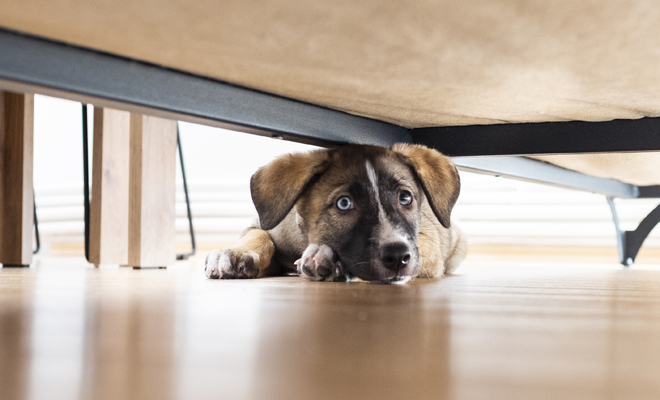Separation anxiety in dogs is an issue that worries many pet owners and even veterinary staff, as it can have serious consequences for the health of canines, as we will see later.

When dogs have high levels of anxiety, their behavior changes for the worse. That’s when their behavior becomes destructive, they can break furniture, vomit, urinate everywhere or make a lot of noise during the absence of their caregivers (howl or bark non-stop).
This anxiety can occur before the owner leaves the house, since dogs associate some exit rituals such as putting on their shoes, grabbing the keys, etc., knowing that they will soon be left alone. This makes them start to feel nervous and overwhelmed. This is a more common problem than you might think, since it affects about 15% of dogs. Even this separation anxiety can be experienced by other pets like cats.
In this article we tell you what separation anxiety in dogs is, the most obvious signs that your canine friend is not going through his best moment, and some tips to help your pet. Do not lose detail!
Separation anxiety in dogs: what is it?
- Separation anxiety in dogs is understood as the level of distress that some dogs experience when feeling alone at home. These are generally dogs with a high level of attachment to their owners. It also usually occurs in dogs that have been rescued from kennels.
- Mentzel, RE (2006) defines anxiety as: “a reactionary state, characterized by a greater possibility of emitting behavioral and autonomic responses similar to fear, associated with separation, with alteration of self-control and therefore loss of adaptability”.
- This is a subject that occupies many animal specialists and for this reason studies have been carried out in order to evaluate the signs associated with the fear that dogs present when separated from their owners. It is therefore an animal behavior disorder that can have serious consequences.
- Due to separation anxiety, many dogs are abandoned by their owners, because they do not know how to interpret their destructive behaviors and, far from understanding that they are expressing their fear and anguish, they brand them as badly behaved, getting rid of them.
- It is important to understand that not all canine misbehavior is explained by separation anxiety, since it is necessary to evaluate various factors such as the dog’s health and even its age. Destructive behaviors are to be expected to some extent, during their puppyhood.
Known symptoms of separation anxiety in dogs
The symptoms of separation anxiety in dogs can be divided into 3 main groups. But keep in mind that not everyone has the same symptoms. It can be a mixture of these groups:
behavioral symptoms
It refers to destructive behaviors such as damaging objects and they can even harm themselves when doing so. It is the way in which the dog manages to relieve some of his anxiety about him by being left alone at home.
Excretion
Another common symptom is the emission of urine in any part of the house. It can also present as very loose stools (similar to diarrhea).
vocalizations
This means that the dog can emit constant barking, howling and even whining during the entire time that the dog is alone, with no one at home.
Although these are the most common symptoms, your dog may also present others such as: excessive panting, compulsive licking, salivating a lot, excessive sweating, mutilating himself. You can also present motor alterations: repetitive behaviors or inactivity.
Gastrointestinal symptoms can also be present, altering your weight: anorexia, vomiting and/or diarrhea. In these cases, the ideal is to go to a veterinary professional to evaluate your pet and to give you a more accurate diagnosis, thus helping your dog friend.
Causes of separation anxiety in dogs
Determining the causes of separation anxiety in dogs can be a somewhat complicated matter, as there are many factors that can cause it. However, here we mention the most common:
- That the dog has been weaned prematurely from its mother.
- Dogs that have been previously abandoned by other people.
- Removals or changes in the house.
- Dogs that have experienced the loss of their caregivers (deaths, moving to another country, etc.).
- Alterations in daily routines, such as schedule changes for walks, meals, etc.
- Change the amount of time the caregiver spends at home with him.
Remember that your dog makes associations and if something has happened that he experienced in a negative way while he was alone, he will think that loneliness is the equivalent of being in danger.
It is important that if a dog is suspected of experiencing separation anxiety, it should be evaluated by a specialist. It is necessary to rule out that there are no physiological aspects that determine their behavior change.
How to help my dog with his separation anxiety?
If your canine friend is experiencing separation anxiety, you can help him by making simple changes:
Change routines without going out
Generally, when we go out we do certain things like turn off the light, grab the keys, etc. Your dog associates this with you leaving and feels a lot of stress. You can help him by doing the same thing throughout the day without going out, so that he stops associating it with him being alone.
Wait the love for later
When you leave, you will surely want to say goodbye with great displays of affection, but this is a mistake. Say goodbye, yes, but avoid giving him too much attention before you leave, and the same when you arrive. We know how difficult it is to arrive and not greet him and give him a lot of love, but the best thing you can do is wait a moment, until he calms down and relaxes before greeting him and giving him all your love.
help release energy
When dogs have too much energy, they tend to have negative behaviors if they are not channeled properly. Offer him a daily dose of exercise (run or walk with him, take him to a park, etc.) and you will see the results. You should also leave toys or prizes at home to entertain him during your absence.
don’t punish him
It is very easy to get upset when we arrive and see the damage done at home. But she breathes and stays calm. He understands that your dog will not be able to associate the punishment with something that happened in the past. He will only feel very sad and bad thinking that you do not love him. The same principle applies to rewards, if he has done well during your absence, there is no use rewarding him, you will not be able to associate it with his past behavior.
If you have a dog, you know that love comes with 4 little legs. If your furry experiences separation anxiety, please understand. Seek veterinary help to evaluate him and make sure that everything is fine with him at the health level. Have patience and a lot of love with your dog. Remember that for him, you are everything in this world.
“Dogs are our link to paradise. They know neither evil nor jealousy nor discontent. To sit with a dog on the side of a mountain on a glorious afternoon is to return to Eden, where doing nothing was not boring: it was peace “.






